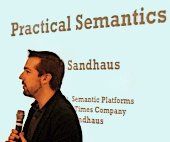Lotico: Difference between revisions
| Line 65: | Line 65: | ||
===[[Linked Data With Ruby and RDF.rb]]=== | ===[[Linked Data With Ruby and RDF.rb]]=== | ||
A hands-on overview | A hands-on overview to produce, consume and work with Linked Data using RDF.rb and the programming language Ruby. Topics covered include: Understanding the RDF.rb object model, learning how to manipulate, parse and serialize RDF in popular formats such as Turtle, JSON-LD, and RDFa. Create and publish RDF using a Ruby-based web-framework such as Sinatra, storing RDF in various repository, including SQL DBs. Query local RDF repositories using the native SPARQL engine, access and update remote SPARQL endpoints using a SPARQL client. | ||
===[[Semantics and Cultural Heritage meet-up at The British Museum]]=== | ===[[Semantics and Cultural Heritage meet-up at The British Museum]]=== | ||
Revision as of 14:13, 26 May 2020
Welcome to lotico - an open, distributed community, a Semantic Social Network that brings LOcation, TIme, COmmunity and ideas together for You and more than 79,000 members worldwide.
A selection of local community groups
|
 community spotlight: Past EventsRecentJena-based Components for Building Semantic Web Applications Semantic Annotation in Content Management Systems SHACL - Shaping the Big Ball of Data Mud: W3C's Shapes Constraint Language Applying Ontologies to Linked Data - Ontotext at John Wiley & Sons Techniques used in RDF Data Publishing at Nature Publishing Group NLP, Text Analytics, and Semantic Technologies Wikidata & rNews - Structuring the world's data Data Stories - Modelling Historical Events & Design Digital Narratives with Data Graphs with SQL & IBM DB2 - RDF Graph Store Semantic Technologies in Financial Services Semantic Web technologies at BBN SHARD - A distributed triple-store built on top of Hadoop Neo4j - The Benefits of Graph Databases PLoS - The Public Library of Science and Publishing on the Semantic Web RIF - W3C Rules Interchange Format with Chris Welty W3C Corner
SPARQL | |||||||||

